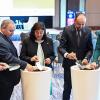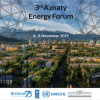Press Releases
Displaying Results 1 - 15 of 15
Kharkiv, the second most populous city in Ukraine situated just 30 km from the Russian border, is among the urban areas most affected by the war and the target of renewed shelling over the last weeks.
According to its Mayor, Ihor Terekhov, 150,000 of the approximately 1.3 million people in the
Ahead of the Ukraine Recovery Conference in Berlin on 11 – 12 June 2024, UNECE Executive Secretary Tatiana Molcean visited Kyiv from 4 to 6 June to discuss UNECE support for the country’s reconstruction and recovery with Ukrainian government officials, the United Nations Country Team, the
With 6.7 deaths per 100,000 inhabitants, road crashes are firmly placed in the top five causes of death in Uzbekistan. Associated economic costs are estimated at 2.8% of GDP annually, states the newly released United Nations Road Safety Performance Review of Uzbekistan.
Worldwide, 1.19 million
As part of the new Masterplan Concept being developed for Kharkiv, Ukraine’s second most populous city, the Norman Foster Foundation along with the Kharkiv City Council, the UNECE UN4UkrainianCities Initiative, Arup, the Kharkivproject Institute and Buildner are launching an international
In her first visit to Brussels as UNECE Executive Secretary, Tatiana Molcean held strategic discussions this week with European Commissioners for environment and energy, and high-level officials responsible for industrial policy, trade and cooperation with EU acceding, candidate and neighbouring
New loan options with Performance-Based Payments (PBPs) will be made available to Small and Medium-sized Enterprises (SMEs) and seven target groups of creditworthy but underserved individuals/households from North Macedonia. The loans are to be used for investments in renewable energy (RE) and
Critical Raw Materials (CRMs) are essential for the production and deployment of low-carbon technologies, such as wind turbines, solar panels, electric vehicles, and batteries. However, they also pose significant challenges regarding supply, demand, environmental and social impacts, and governance
A joint assessment by the Government of Ukraine, the World Bank Group, the European Commission and the UN released in March 2023 estimated the cost of reconstruction and recovery at USD 411 billion. As the destruction of the war continues, UNECE is stepping up its support in preparation for
Despite geopolitical and economic instability since gaining independence, Armenia has become one of the regional leaders in innovation, especially, but not only, in the IT service sector. The past two decades alone have seen the creation of more than 1,000 start-ups providing a range of IT services
Today, Serbia became the first country in the pan-European region to launch a National Policy Dialogue (NPD) on Industrial Safety, supported by UNECE in the framework of the Convention on the Transboundary Effects of Industrial Accidents (Industrial Accidents Convention). Since its accession to the
UN Resident Coordinators based in the countries of Europe and Central Asia have noted that most countries are prioritizing economic recovery during the COVID-19 period and that environmental perspectives are often ignored. The regional interagency Issue-based Coalition on Environment and Climate
Economic and social development in Albania crucially depends on the availability and good quality of water, land, forest and environmental resources, which are, however, under increasing pressure, including from climate change. An online consultation on the Water-Energy-Food-Ecosystems Nexus in
Armenia has used non-tariff measures (NTMs) to contain the impact of the COVID-19 pandemic on businesses and other supply chain actors. However, the Government’s ability to unleash the full efficiency potential of support measures and NTMs was undermined by capacity shortfalls in the areas of trade
Like other countries of Eastern Europe and the South Caucasus (EESC), Belarus has undergone a transition from a centrally planned to a market economy over the past three decades. This transition has stagnated, as current growth drivers wane. Systematic institutional constraints and low levels of
Ukraine, like the other five countries in Eastern Europe and the South Caucasus (EESC) - Armenia, Azerbaijan, Belarus, Georgia, the Republic of Moldova - has grown rapidly following a rocky and difficult transition from a centrally planned to a market economy over the past decades. This momentum,















